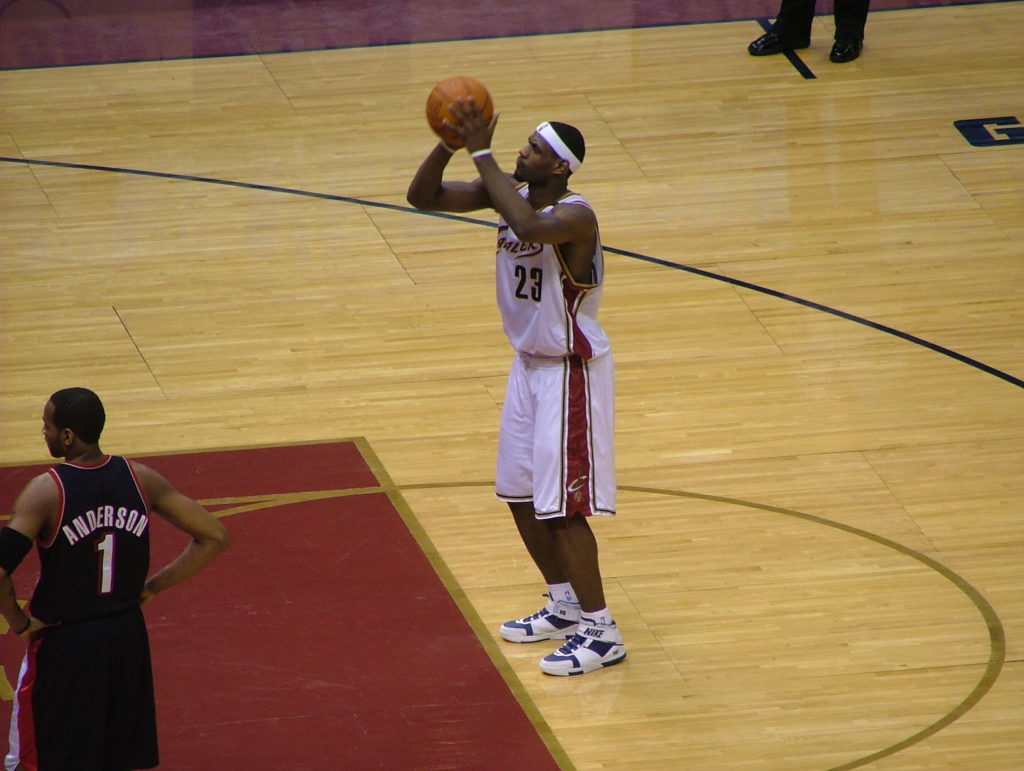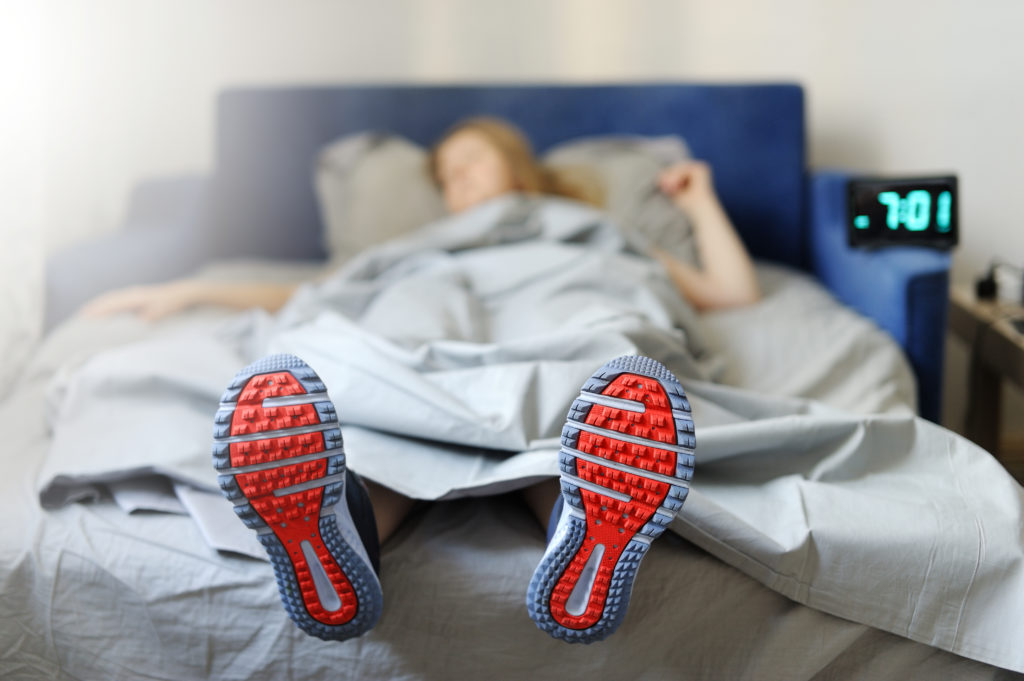LeBron James has made headlines for many reasons over the years. The NBA powerhouse and newly minted Lakers star has earned multiple NBA Most Valuable Player Awards and two Olympic gold medals, among many other accolades.
But more recently, James has been gaining attention for a different reason: The man sleeps a lot. During a recent discussion on The Tim Ferriss Show podcast, James and his trainer Mike Mancias divulged that the basketball pro aims to get at least eight to 10 hours of sleep every single night. Even more recently, James shared on Twitter that he’d slept so deeply (and for a whopping 12 hours) that he accidentally missed a holiday party.
Far from being lazy or indulgent, research suggests King James is really onto something.
James’s commitment to regularly obtaining sufficient, high-quality sleep might help explain why the 34-year-old is still one of the world’s most celebrated professional basketball players in the 16th season of his career. To this day, James out-plays most of his contemporaries — he’s reportedly played more playoff minutes than any man in the history of basketball, and his average regular-season game play is top among all active NBA players. As it happens, James’ penchant for sleep might help explain his success on the court.
Far from being an anomaly, James joins legions of athletes who prioritize getting tons of sleep. Tennis great Roger Federer reportedly gets 10 to 12 hours per night, and stories of other sleep-loving pros abound. Gabby Douglas, Mikaela Shiffrin, Lindsey Vonn, Michael Phelps, Michelle Wie, and Usain Bolt have all made headlines for their proclivity for shuteye, to name just a few.
“Sleep is the most important thing in the world for an athlete,” Dr. W. Christopher Winter, MD, D-ABSM, D-ABIM, D-ABPN, F-AASM, the President of Charlottesville Neurology and Sleep Medicine and CNSM Consulting, told Mattress Clarity via email. “It is as important as food, hydration, and athletic preparation/conditioning.”
Per Winter, even athletes who aren’t operating at the elite level require high-quality sleep on a regular basis in order to sustain and enhance their athletic performance. So no matter whether you’re part of an amateur soccer league, a competitive triathlete, or a weekend warrior, here’s what you need to know about athletes and sleep.
How LeBron Does It
Per Business Insider, James and Mancias shared several details about James’ sleep routine on Ferriss’ podcast. In order to maximize his sleep duration and quality, James says he adopts the following strategies:
- He pays attention to temperature. James has dialed in on the fact that 68 to 70 degrees is the optimal temperature for his own sleep.
- He creates a soothing bedtime environment. He keeps his bedroom completely dark, avoids blue-light-emitting devices (such as TV or his phone) in the 30 or 45 minutes prior to bedtime, and utilizes a sleep app called Calm to fall asleep to soothing sounds.
- He embraces accountability. Per the podcast, Mancias regularly checks in with James to confirm that he’s getting his eight-plus hours of sleep each night.
Together, these strategies help ensure James gets the sleep necessary to thrive on the court and off.
Of course, pro athletes such as James face a much more demanding lifestyle than the average Joe or Jane Athlete. Brutal training regimens, travel-induced jet lag, late-night games, and the stresses of being in the spotlight can all take an extra toll and require additional recovery time.
“Circadian rhythm disruption, such as may occur with requisite travel, has been shown to have clear effects on athletic performance,” Dr. Brandon Peters, M.D., a board-certified neurologist and sleep medicine specialist who practices at Virginia Mason Medical Center, told Mattress Clarity via email.
But even if you’re not up against the same demands as elite competitive athletes, Dr. Bo Babenko, PT, DPT, head physical therapist at Halevy Life (which has trained the likes of Hugh Jackman and Ryan Seacrest), told Mattress Clarity via email that all athletes need to make sleep a priority — and they may benefit from obtaining even more sleep than the recommendation for the average population, which is currently around seven to eight hours per night.
RELATED: Best Mattress for Athletes
“Lebron… has been quoted as sleeping upwards of 12 hours a day,” Babenko says. “Babies sleep significant amounts of time to foster their development. And while it may not be necessary (or possible) to sleep THAT much, we certainly should be getting as much as we can.”
Why Athletes Need Lots of Sleep
Even though we might not all have a dedicated coach encouraging us to sleep eight to 10 hours a night, research consistently finds that athletes of all stripes require sufficient sleep in order to perform their best.
“Athletes can universally benefit from prioritizing sleep,” Peters says. “Not only will it optimize their performance, but it likely will have positive benefits on mood, concentration and memory, and relationships. Professional athletes — and us mere mortals — all benefit from sleeping well.”
For instance, many studies have found that sleep is one of the most effective tools for muscle recovery. Muscle recovery, in turn, is essential for sustaining muscle mass, strength, and power.
“Athletic performance certainly needs skill development followed by building capacity to achieve higher levels of performance,” Babenko says. “But the most important thing is recovery to get the most out of each session. It is low-hanging fruit that simply cannot be ignored.”
Additionally, adequate sleep is regularly linked with improvements in athletic performance. For example, a 2011 study from the journal SLEEP found that basketball players who slept 10 hours per night for five to seven weeks demonstrated faster sprint times, less fatigue, and greater shooting accuracy than they did prior to increasing their sleep (1).
On the other hand, failing to get enough sleep may have a direct correlation with impaired athletic performance.
“Untreated sleep disorders, including sleep apnea and insomnia, can be profoundly detrimental,” Peters says.
Even athletes who don’t suffer from sleep disorders may find their performance diminishes when they don’t get enough sleep. A recent survey of NBA players’ late-night Twitter usage (which is associated with diminished sleep duration) found that athletes who stayed up late the night before a game performed significantly worse during the next day’s competition.
These results seem to hold true across different sports. Sleep deprivation is consistently linked to diminished athletic performance in the form of slower response times, fatigue, impaired judgment and decision-making abilities, and other negative effects (2, 3). A study of young athletes also found that sleep deprivation significantly increases the risk of injury (5). Explains Babenko: “A stressed human is much less likely to recover from any injury. Sleep improves stress; we like to keep it simple.”
For athletes and laypeople alike, sleep deprivation can also yield several negative consequences in the form of impaired cognitive function, diminished mood, fatigue, and a higher risk of developing chronic health conditions.
Even if an athlete seems capable of performing well after a night or two of sleep deprivation, Winter says the effects of chronic poor sleep will eventually catch up with them. “Just because you can score 30 points after a night where you intentionally skimped on sleep, does not mean you will always be able to do it,” he says. “Choosing to get inadequate sleep will shorten your career.”
While sleep, in general, is essential for athletic performance, Winter says deep sleep — the stage of sleep that typically occurs during the first two or three hours of a sleep session — is especially important for physical recovery.
Peters concurs. “Slow-wave sleep, during which growth hormone is released, is very important for physical recovery and the repair of the body’s tissues,” he says.
Sleep Like an NBA Player
If you’re an athlete who’s looking to up your game, then you’d do well to incorporate high-quality sleep into your training regimen.
“All athletes absolutely should [prioritize sleep],” Babenko says. “The more we understand about the human body, the more clear it is that sleep is vital to our recovery.”
In that spirit, here are some strategies to increase your chances of obtaining high-quality sleep on a consistent basis:
- Keep your bedroom cool, dark, and quiet. This tip is fundamental to good sleep hygiene. Research consistently finds that most people sleep best in an environment that is as dark as possible, quiet, and relatively cool (think somewhere between 60 and 67 degrees).
- Aim to go to bed and wake up at the same time every day. Maintaining a consistent sleep and wake schedule helps train your body to anticipate falling asleep and waking up at a particular time, which helps regulate your body’s internal clock.
- Create a soothing bedtime routine. Most of us need some transition time to unwind before falling asleep. Taking a warm bath, reading a good book, meditating, or listening to calming music are all great ideas that can help your mind and body get ready for slumber. “I also highly encourage crocodile breathing (an exercise to down-regulate the nervous system) and foam rolling right before bed as it helps calm the body down and improve deeper sleep,” Babenko says.
- Avoid blue light for an hour or so before bed. There’s a reason James shies away from screens prior to his bedtime. Research consistently finds that the “blue light” emitted by electronic devices (such as phones, tablets, laptops, and TVs) can interfere with our ability to sleep soundly. This is largely because the light emitted from screens may trigger cells in our eyes to tell the brain that it’s daytime rather than bedtime, which can suppress the production of the sleep hormone melatonin.
- Consider athlete-centric bedding. When Babenko is advising athletes about how to obtain better sleep, he says, “We discuss the firmness of the mattress and the positions they tend to sleep in to see if they align.” In addition to investing in a comfortable mattress, some athletes also swear by bedding that’s designed with recovery in mind, such as Celliant.
Even if you struggle to fall asleep, Winter says downtime in bed is still valuable for recovery. “Do not view simply resting in bed as wasted time if you cannot fall asleep,” he says. “It is not.”
Of course, all the better if you can actually fall asleep. By making high-quality sleep a priority on a daily basis, you’ll significantly improve your odds of developing and sustaining your desired level of athletic prowess. In fact, Babenko says, “If you spend numerous hours a week and significant financial resources towards your craft, no matter your level, you 100% are leaving money on the table if you do not prioritize your sleep.”
Featured image: Everett Collection/Shutterstock
[Editor’s Note: The content provided on this site is for general informational purposes only. Any information provided is not a substitute for professional medical advice. We encourage you to consult with the appropriate health expert if you have concerns.]
References
- Mah, C.D. et al. “The Effects of Sleep Extension on the Athletic Performance of Collegiate Basketball Players.” Sleep. 2011 Jul 1; 34(7): 943-950. doi: 10.5665/SLEEP.1132
- Nédélec, M. et al. “Stress, Sleep and Recovery in Elite Soccer: A Critical Review of the Literature.” Sports Medicine. Oct 2015; 45(10): 1387-1400. https://doi.org/10.1007/s40279-015-0358-z
- Thun, E. et al. “Sleep, circadian rhythms, and athletic performance.” Sleep Medicine Reviews. Oct 2015; 23: 1-9. https://doi.org/10.1016/j.smrv.2014.11.003
- Luke, A. et al. “Sports-related injuries in youth athletes: is overscheduling a risk factor?” Clinical Journal of Sports Medicine. 2011 Jul; 21(4): 307-14. doi: 10.1097/JSM.0b013e3182218f71




